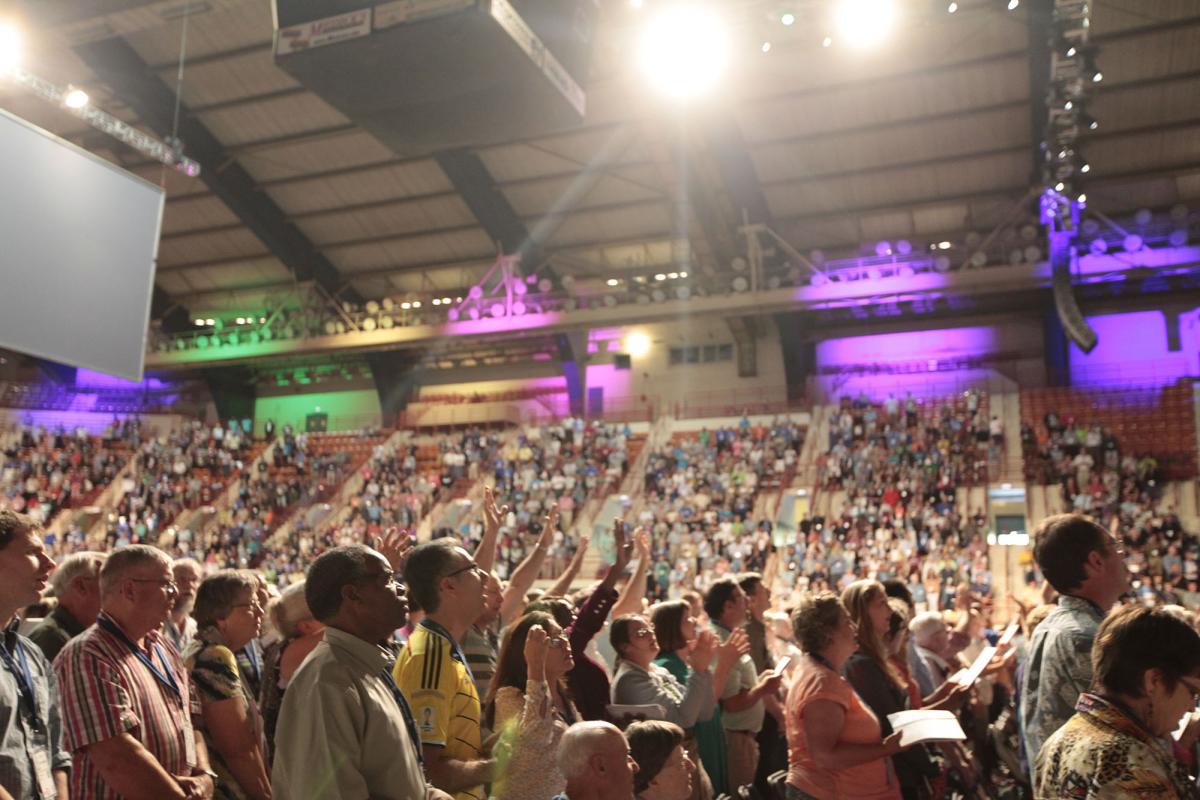“Never has the world needed our message more…. Now is the time to risk everything for our belief that Jesus is the way to peace;… now is the time to live what we have spoken.”
Ron Sider’s words to the Mennonite World Conference Assembly 11 gathered in Strasbourg France in 1984 famously launched Christian Peacemaker Teams, an organization that uses nonviolent direct action to confront systems of violence and oppression.
Assemblies take place every six years. Although they only represent one facet of the work of MWC, these gatherings “provide the primary vehicle for interaction with Anabaptists on other continents,” says MWC general secretary César García.
Meeting old and new friends from around the world while participating in workshops, service activities, and some local tourism makes for an unforgettable experience.
“Assemblies facilitate a sense of global interconnectedness and mutual learning that has the potential of transforming lives, congregations and even national churches,” says César García.
Over the past 16 Assemblies, plenary speakers have left participants with life-altering challenges.
“Do we have the courage to move from the backlines of isolationist pacifism to the frontlines of nonviolent peacemaking?” Ron Sider prayed “that with our eyes fixed on the crucified one, the church will dare to pay the cost of being God’s reconciling people in a broken world.”
At the Assembly before that, in Wichita, Kansas, USA, in 1978, Albert Widjaja from Indonesia gave a call to economic and climate justice that rings true even today.
“The kingdom of God is not a static entity but a dynamic movement of new visible social order in which the members see God’s call to share his love with others, to look after the afflicted, to defend the powerless, and to bring about this justice in the world political and economic system, and to let his lordship be known in world history,” Alberta Widjaja said.
“We cannot afford to remain neutral” in the face of oppressive systems and the global ecological crisis, he said. “We should participate in the action of God to manifest his kingdom as a living reality of God’s presence in the church.”
In Paraguay in 2009, Nzuzi Mukawa from DRC continued this prophetic vein. “The prophet Micah tells us we cannot worship God and forget about social justice.”
“In a world that is very similar to Micah’s Judah, the church must respond to the same call for repentance, for loving mercy and for walking humbly before God,” Nzuzi Mukawa said. “Following Jesus clearly means we have to follow his path of justice. Proclaiming God’s justice must be a part of our worship, our discipleship and our mission.”
“[We] often fail to see how it [justice] is falling short within our own structures,” said Nzuzi Mukawa as he went on to urge the church to ordain women, accept minority group leadership, “rise up and defend” children, support women suffering from sexual violence and act on behalf of poor countries by eliminating their international debt, granting more access to trade and by rich countries paying damages for pollution.
Also calling the church to look at the condition of its own house, in Harrisburg, Pennsylvania, USA, in 2015, Young AnaBaptist (YAB) Remilyn Mondez from the Philippines framed her call to unity with a heart-rending story of church schism.
“God must be smiling from up above as God savours the sweet aroma of worship, rising to his throne, offered by his children all over the globe,” she said. “Thus, I wonder: does God weep when the very same children cannot walk together in peace? What does God think when he sees us walking in conflict, struggling for reconciliation, and too often, choosing to part ways because it is the best option?”
The upcoming Assembly 17 in Semarang, Indonesia, 6–11 July 2021 can be anticipated to present more prophetic calls from around the world under the theme “following Jesus together across barriers.”
—Mennonite World Conference release
